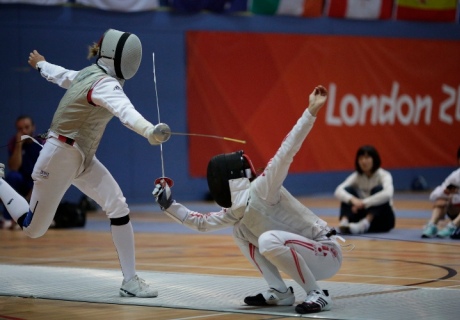En Garde - when the Japanese fencers came to Imperial

Meet the Japanese fencing team preparing for London 2012, using the Ethos sports centre to practice their parries.
Over the past few weeks Imperial has played host to the Japanese fencing team as they prepared for London 2012, using the Ethos sports centre to practice their parries. Reporter caught up with their team liaison, Eddy Vertheim, following a history-making weekend for Japanese sport.
Sitting with Eddy Vertheim in the Ethos reception it is clear he is still buzzing from the previous day’s celebrations. Japan won a silver medal in the men’s team foil event on Sunday 5 August, which was not only their first team fencing medal but only the second they have ever won in the sport.
“It was a nail biting fight just to get to the final,” Eddy says. “The semi-final against Germany ended in a draw, and it went to extra time and sudden death. That puts a minute back on the clock and the first hit wins. The Japanese fencer, Yuki Ota, displayed true Kamikaze spirit – it really was all or nothing – and he did it.”
For the uninitiated, Eddy says the skill of the fencer is as much mental and it is physical. “It is really a form of chess. You have to read your opponent and check their approaches before you can attack. Then imagine doing that wearing a ‘portable sauna’, which is effectively what the kit creates, with the face mask, jackets and breeches.”
It’s also traditionally an individual sport – if it goes well the glory is yours – if not, there is no one else to blame. “The team event really adds to the pressure to perform,” says Eddy. “You’re not just fighting for yourself but for your team mates as well.”
The atmosphere in the Excel Centre only added to the drama on the day. “I’ve never experienced that kind of reaction from a crowd – even the stewards said they’d never seen anything like it. To see such a close fight is not something you witness every day.”
Despite losing to Italy in the final, the Japanese team are delighted with the result, which marks the combination of four years hard work since Beijing in 2008. Eddy has witnessed firsthand the preparation and commitment required to perform at this level. “Dedication to the training is one thing, but it’s the human sacrifice which leaves the longest impression – missing birthdays, weddings and other key events in the lives of friends and family, just to get that extra day’s training in. That takes a lot of courage and guts and it’s all been part of the drive to get to London 2012.”

Eddy’s role as team liaison is to make sure the athletes have everything they need and to handle logistics. He says the Japanese team were very happy with the hospitality they received during their time at Imperial. “The athletes train for the Olympics but when the moment arrives and the physical work is done, it becomes about their psychological and emotional state. Acclimatising from one culture to another can be hard, but everyone at Imperial has been so welcoming. We were made to feel like guests not clients – the facilities are also fantastic – but it is the friendly welcome we received from everyone which has impressed the team the most.”
The team have now headed back to Japan to join the country’s celebrations and the many media interviews which are lined up in the wake of their success. Watch a video interview with the fencers.
— Simon Watts, Communications and Development
Article text (excluding photos or graphics) © Imperial College London.
Photos and graphics subject to third party copyright used with permission or © Imperial College London.
Reporter
Press Office
Communications and Public Affairs
- Email: press.office@imperial.ac.uk
